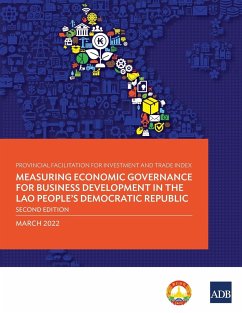
COMPETITIVENESS OF NATIONS 3, THE
Versandkostenfrei!
Versandfertig in 1-2 Wochen
119,99 €
inkl. MwSt.

PAYBACK Punkte
60 °P sammeln!
In the existing reports on national competitiveness and rankings such as IMD World Competitiveness Yearbook and WEF Global Competitiveness Report, there are sizable discrepancies in the ranking order for the same countries. As a result, the reader is often confused because such an outcome creates difficulties for government officials when translating these findings into real-world policies. These discrepancies are actually due to the differences in logic and analytical models used by IMD and WEF. Therefore, in recognizing the problems and limitations of these models, this book presents the IPS...
In the existing reports on national competitiveness and rankings such as IMD World Competitiveness Yearbook and WEF Global Competitiveness Report, there are sizable discrepancies in the ranking order for the same countries. As a result, the reader is often confused because such an outcome creates difficulties for government officials when translating these findings into real-world policies. These discrepancies are actually due to the differences in logic and analytical models used by IMD and WEF. Therefore, in recognizing the problems and limitations of these models, this book presents the IPS model as a new approach. As an extension of Michael Porter's diamond model, it demonstrates a robust set of methodologies as well as offers a number of key policy implications for countries around the world that wish to enhance their national competitiveness. The analytical tools used in this book can be further utilized for other units of analysis such as industries and firms. As this book provides a series of sophisticated methodologies and specific guidelines for enhancing national competitiveness, both academics and practitioners can derive useful implications from this research. Alongside the theoretical frameworks and methodologies for national competitiveness presented in this book, the special theme and focus of this third volume is the fourth industrial revolution and the emerging technologies that are relevant to corporate and national competitiveness. The discussion on the digitalization of business began as early as the 1990s, but emerging technologies such as big data, artificial intelligence, and cloud computing have only been a recent trend. Furthermore, the COVID-19 pandemic has accelerated the adoption of emerging technologies by both firms and countries. Yet, despite the growing importance of emerging technologies, firms and governments seem to be lagging in effectively integrating them into their operations. To address these challenges, this book explains how emerging technologies have affected firms, industries, and countries. It also welcomes discussion on how firms and countries are responding to the changing environment to enhance their competitiveness through these new technologies.














